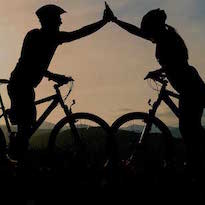Schooled! TED Talks does it again!
There is no better “quick ‘n easy” way to deepen your expertise than to look outside your area of mastery and draw parallels to others’ insights, knowledge, and experience. TED Talks are a great resource for the casual shopper of inspiration.
Take teaching, for example. Although we primarily lead adults in group exercise classes, indoor cycling instructors share many parallels with teachers of children, but not in ways you might think.
Check out Rita Pierson’s 2013 TED Talk “Every Kid Needs a Champion,” below to see how she prioritizes personal connection or relationship over all else when helping children succeed.
Pierson quotes Dr. James Comer, a professor of Child Psychiatry at Yale University, who insists that teachers have high standards for their students as a form of respect. Mutual trust and respect are the foundation of a positive relationship. He says, “No significant learning occurs without a significant relationship.”
The same can be said in the cycling studio: No significant engagement can occur without significant investment. Your riders have to trust and respect you first. Only then will they be open to what you have to teach them.
Pierson, with her lifelong passion for teaching, radiates when she closes her TED Talk with “We are educators. We are born to make a difference.”
Making a difference in the lives of others is what many indoor cycling instructors and other fitness professionals cite as their number one reason for pursuing the work they do.
Time and time again, indoor cycling instructors say that excellence, passion, and thatcommunity feel of a cycling class is what drives them to be better instructors. They demand more from their riders and are rewarded with energy, gratitude, and measurable improvement in their clients’ fitness and overall well-being.
Pierson quotes Steven Covey, author of The 7 Habits of Highly Effective People, when she says, “You ought to just throw in a few simple things like seeking first to understand as opposed to being understood; simple things like apologizing.” She goes on to illustrate how apologies elevate a relationship.
When Pierson speaks of one child who missed 18 out of 20 questions on a test, she relates his surprise at getting a +2 and a smiley face when he expected an F. She assured him that a +2 means he’s “on the road.” She goes on to say, “We review and we get better. A -18 F sucks the life out of you. A +2 says, ‘I ain’t all bad.’”
What indoor cycling instructor doesn’t know this kind of positive reinforcement—giving credit to those who show up and stay the length of the class, even in the absence of an outstanding performance? The +2 in the cycling studio might be a heartfelt high five, even though the rider was 10 minutes late, or a discreet wink at the guy who skipped the last interval, which acknowledges, “I know you can do better, but you’re ‘on the road.’”
We boost the morale of our clients because we know without self-confidence, self-efficacy, and self-respect, transformation cannot occur.
It’s worth repeating Pierson’s closure to this magnificent, inspiring speech. She says, “Tough job? Yes, but not impossible. We can do this—we’re educators, we’re born to make a difference!”
Aren’t we all?
At ICA we’ve posted on another incredible TED Talk with a great lesson for indoor cycling instructors. It’s one of the most viewed TED Talks of all time. Watch it here.
NOTE: If you come across an inspiring TED Talk that you believe has excellent corollaries to what we do in the cycling or fitness studio, please send us the link and we’ll share it with other instructors around the world!


Great stuff! Thank you!